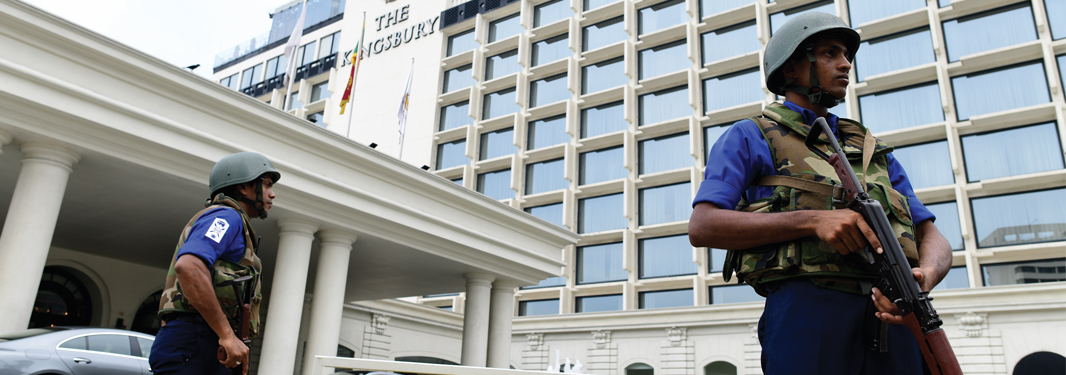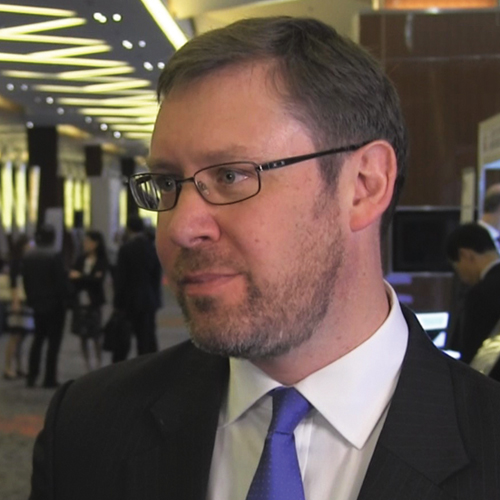Political Risk
Continuing Exposure
Sri Lanka bombings call for revisiting terrorism and political risk management, market watchers say.

ON GUARD:Following a series of bomb blasts that targeted hotels and churches in Colombo, Sri Lanka on Easter Sunday, soldiers stand watch outside The Kingsbury Hotel. Underwriters will be monitoring their exposures to high risk occupancies such as hotels because many terrorist groups view such properties as preferred targets.
Photo Credit: Richard Atrero de Guzman/Sipa USA via AP
Sri Lanka's Easter Sunday bombing attacks have increased attention to terrorism risk management for organizations in the Asia-Pacific region, including reviews for adequate insurance coverage and mitigation methods, according to insurers and consultants.
The event highlights “the importance of ensuring that the risk of terrorism is included within an organization's overall risk management,” said Richard Floyd, head of terrorism and political violence of Asia at Willis Towers Watson. Overall, risk appetite and available capacity of insurance companies providing terrorism and political violence remain stable after the event. “Underwriters will be monitoring their exposures to higher risk occupancies such as hotels, and are likely to be more selective with the risks they decide to deploy capacity against,” he added.

In the short-term, we have seen an upswing in inquiries for terrorism insurance from Sri Lanka, other complex and potentially hostile territories and from the hospitality industry as a whole.
David Guest
Axa XL
The bombings in Sri Lanka marked one of the bloodiest terrorist attacks of the past few years. “Many have thought of Sri Lanka as a low-risk environment and the incidents as a complete surprise,” said David Guest, regional product leader for crisis management of Asia-Pacific at Axa XL. Tommy Elliot, regional director, Circle Asia, a specialist insurer and MGA on events risk management, noted no region is safe from terrorism, even places like Hong Kong and Singapore. Therefore, it is important to manage these risks, particularly for the increasing number of local and international events hosted in Asia.
Hotels continue to be a preferred target for many terrorist groups. “Asia and Sri Lanka are no exception and follow in the steps of Mumbai, Bali and Jakarta, amongst others,” said Guest. About 160 attacks happened at hotels around the world between 1970 and early 2016, and half of these involved the use of explosives. Attacks on multinational hotel guests ensure global television and social media coverage. For some tourism-dependent countries, this sector has a major impact on the economy.
In the wake of the bombings, “there is a huge demand from uninsured properties to insure including terrorism, and also from those clients who are insured without terrorism to include such cover as well,” said Jagath Alwis, director and chief technical officer of Ceylinco General Insurance Ltd. For insurers, their concern will be to insist on more risk management processes, such as security checks at building entrances.
Some organizations in Asia-Pacific have paid greater attention to terrorism risk management, which embraces aspects like employment of expert security personnel, actively monitoring shifts in the risk environments, coordination with government entities where possible, along with efforts related to terrorism scenario planning, risk-quantification initiatives and structuring transfer of risk to insurance markets, said Floyd.
However, Floyd said “it is fair to say that many organizations in the Asia-Pacific region are still developing formal approaches to terrorism risk management and do not undertake scenario planning, mitigation strategy formulation and contingency protocol development.”
Well-managed companies should implement terrorism assessment as part of their risk management. Some companies already discuss risk-reduction measures with architects and planners. Risk mitigation measures focus on strategic policies and operational procedures. Guest said “that is where we see clients working with insurers and security risk advisers to complement and enhance their own efforts.”
“In the short-term, we have seen an upswing in inquiries for terrorism insurance from Sri Lanka, other complex and potentially hostile territories, and from the hospitality industry as a whole,” said Guest. The event also causes clients' concerns about growing risks in less-developed countries and how to manage them.
Major insured losses from the bombings are estimated to come from hotels. Total insured losses caused by this event are anticipated to be less than 1 billion Sri Lankan rupees (US$5.8 million), said Alwis. The claims will fall under Strike, Riot, Civil Commotion and Terrorist coverage under the National Insurance Trust Fund, and are expected to be “well within the deductibles of their XL (excess of loss), which they could absorb,” he added.
The terrorists' basic objective is to cause mass casualties, not to maximize property damage, said Gordon Woo, catastrophist at risk modeler RMS. Hotel chains' terrorism coverage may be impacted globally, as well as business interruption.
For differing reasons, Floyd said the risk of terrorism is deemed moderate in the Philippines, Thailand and Indonesia, with heightened awareness and threat levels in countries like Singapore. Geography is not the only driver for analyzing risk and threat profiles as there are numerous other variables for consideration, such as the occupancy and industry sector of an organization. Notable occupancies with higher risk profiles include transportation, hotels, power and utilities, leisure and entertainment.
“Risk assessment must take into account not only the geographic spread of threats but also new means of waging terror,” said Guest. Increasingly, insurers are designing products for clients to deal with both the asset and human impact of these events.
As attack methods evolve, buyers are seeking to expand terrorism definitions in insurance coverage to include active assailant events, said insurance broker Marsh in a report. Hotels, casinos, sports arenas, restaurants, retailers, movie theaters and others are looking to include active shooter threat, which can result in bodily injury to employees and customers, property damage, direct or indirect business interruption and reputational damage.
Companies with significant exposure in developing markets are considering how to address these risks through a variety of coverages, including property terrorism, political violence, political risks and workers' compensation. Many insurers are receptive to terrorism coverage to include such coverage, said Marsh.
“The traditional terrorism insurance promise to pay is now often incorporating security advice and extra expense coverage related to people risks, such as public relations and brand rehabilitation costs, counseling and medical expense,” said Guest.
In addition to commercial insurance, a public-private risk-sharing mechanism can provide coverage for terrorism risk. Property insurance policies can be extended to include terrorism coverage in accordance with local terrorism pools, said Marsh. In the Asia-Pacific region, Australia, Hong Kong, India, Indonesia, Sri Lanka and Taiwan have this public-private risk-sharing mechanism.
Sri Lanka has the longest history of terrorism development in Asia, with the SRCC&T fund originally established in 1984. Alwis said insurers offering terrorism insurance cede the risks 100% to the SRCC&T fund under the NITF, which is also the only reinsurer in Sri Lanka. For cover limits more than those provided by the NITF, insurers usually arrange cover in overseas markets and companies do not retain any portion of the risk.
Reinsurance capacity for terrorism risks continues to develop and grow, said Marsh. Many insurers use the commercial reinsurance markets. For the January 2018 renewal, the majority of reinsurance programs that included terrorism coverage averaged from flat to an increase of 10% on a risk-adjusted basis.
Today's threats come from a more complex mix of sub-national groups or global alliances driven by political, religious, ideological or economic motivations. “Attack methodologies have evolved to not only meet new goals but address defense, particularly incorporated by the hospitality industry,” said Guest. After the Islamic State lost territory in Syria and Iraq in 2017, Guest said its focus shifted to other countries with a fragile security environment and underlying political, religious and ideological tensions. The security threat across Asia, as evidenced in Sri Lanka, is not new but an evolution of threats, which have existed in one form or another for the past 30 years or more.



























